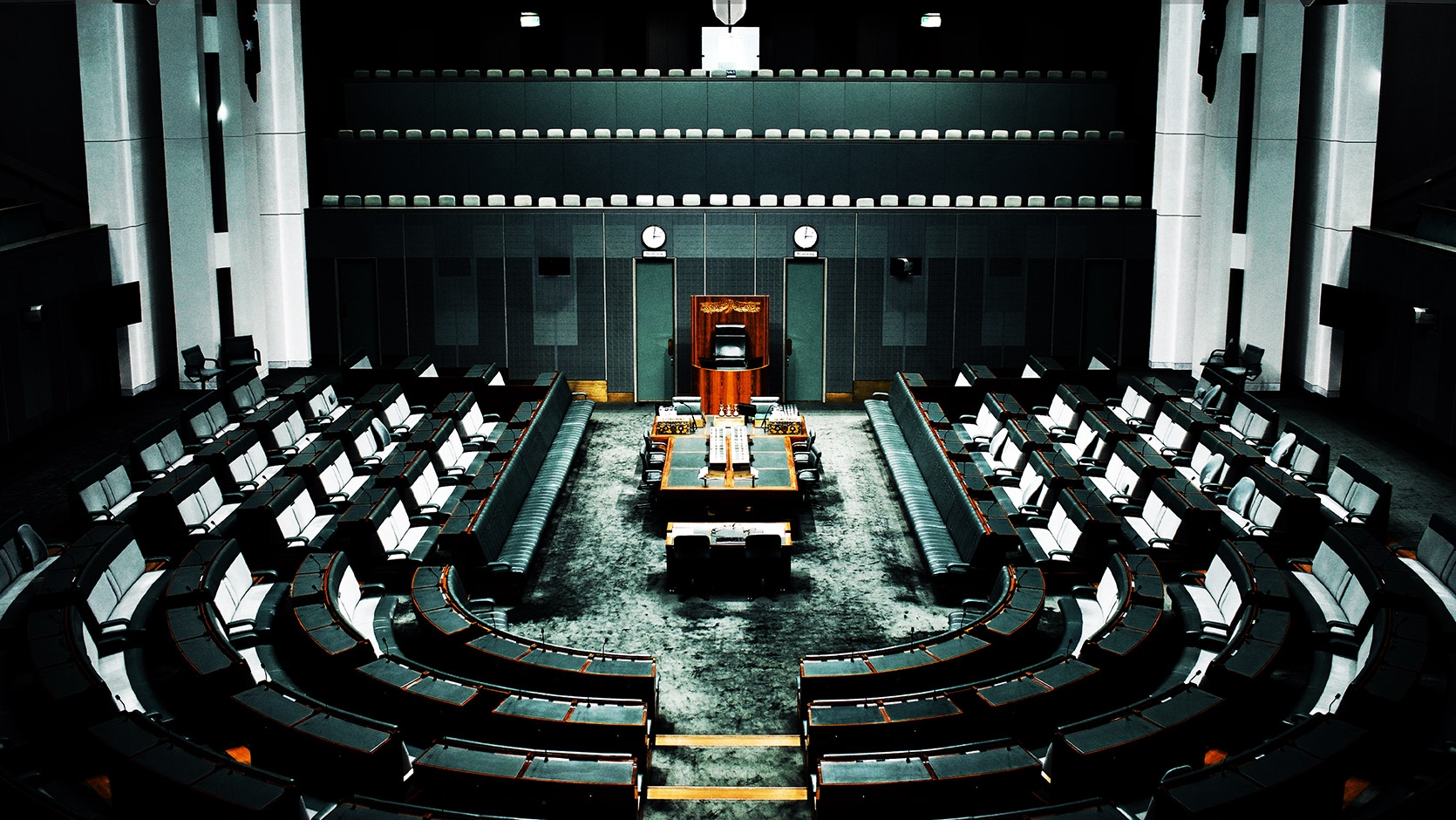In the Australian legal system, the main ways that laws are made are by:
- parliaments passing Acts known as ‘statute law’;
- the executive developing ‘delegated legislation’, which is regulations, rules, ordinances etc., made under the authority of parliament and statute law;
- courts interpreting the law and deciding cases on the basis of how similar cases have been decided in the past and applying those decisions to the circumstances of the case they are currently deciding, known as ‘common law’.1

Statute laws are laws made by federal, state and territory parliaments and are developed to govern the whole of society. Once statute law is enacted or passed through parliament, it becomes law.
A proposed law, or amendment to existing law, is introduced into parliament in the form of a Bill. Bills may be introduced first in either the House of Representatives or the Senate but must be considered and passed in identical form by both houses of the parliament and then presented to the Governor-General for royal assent. The diagram below illustrates the process for a bill to become an Act of Parliament.
For more information on making laws click here to access the Making Laws Infosheet 7.
Often an Act of Parliament will include parts that give power to a Government Minister or another member of the executive to create a law that deals with particular aspects of that Act, usually to do with the details of how the Act operates. There are different ways in which delegated legislation becomes law, depending on whether it is made under an Act of the Commonwealth Parliament or one of the state or territory parliaments.1

Australian Law is based on common law, which originated in England. During the middle ages, the King of England appointed judges who travelled from village to village to hear legal disputes. These judges would record the reasons for their decisions, which were then used by themselves and other judges as the basis for future legal decisions. Over time this resulted in a common system of law used throughout England.
While statutory law aims to provide rules to govern society, it is impossible for it to fit every situation. Judges interpret statutory law and set a precedent where statutory law is unclear or inadequate. This precedent then becomes common law for judges presiding over future cases to follow. When there is a conflict between common law and statute law, statute law overrides common law.
Common law usually includes the principles of equity. Equity Law has to do with fairness and also stems from the middle ages in England. Sometimes a judge's application of the common law was considered unjust. When this happened, people were entitled to complain to the King of England, who could use his power to overrule an unfair common law ruling. Over time the number of complaints increased, so the King of England set up a special court to deal with matters of fairness and justice. These equity courts still exist today in both England and Australia.
Doctrine of Precedent
The Doctrine of Precedent are rules developed by the courts to guide judges in applying common law.
The main principles of the doctrine are:
- each court is bound by the decisions of courts higher in the hierarchy
- the decision of a court in a different hierarchy or lower in the same hierarchy may be persuasive but will not be binding
- generally, a court will not consider itself bound by its own past decisions but will depart from them only with reluctance
- only the reason for the decision of a past case is binding
- remarks in passing are not binding but may be persuasive
- precedents do not lose their force by lapse of time.
Once a judge makes a decision, it becomes common law, which future judges must follow. This ensures that:
- similar cases are treated with consistency
- there is certainty in the law
- there is predictability
- people know what the law is in order to obey it.9

To ensure legal proceedings are efficient and fair, a great number of people are generally involved. In most cases, matters are held in an open court. This means that many people may be present. According to an Australian government website, these people may include:
The judge is responsible for the fair conduct of a trial and ensures it operates according to the rules of law and that those involved act within the guidelines of good legal practice. The judge answers questions on law, directs the jury and maintains the smooth operation of the court. At the end of a trial, the judge addresses the jury and instructs them as to the applicable law and makes comments on the evidence where required. The judge is also responsible for sentencing.
A judge presides over trials in the District Court and the Supreme Court. The judge is referred to as The Honourable Justice 'Smith' and is addressed as "Your Honour".10 In a criminal trial, the judge wears a wig and a red gown.
A president is similar to a judge and presides over more serious matters before the Children’s Court.
A magistrate hears trials in the Magistrates Court and Children’s Court without a jury.
The associate is a member of the judge's personal staff and helps in the administration of the court, including preparing documents, recording decisions and issuing forms and warrants.10
They sit in front of the judge in the District Court and the Supreme Court, and the President of the Children’s Court and assist in the running of the court.
A judicial support officer is similar to an associate, but this person sits in front of a magistrate in the Magistrates Court and Children’s Court.
A lawyer who presents the prosecution case. In the District Court and the Supreme Court, this is usually a lawyer from the State or Commonwealth office of the Director of Public Prosecutions. They conduct criminal proceedings on behalf of the State.
In the Magistrates Court, this is usually a specially trained police officer, a lawyer or a representative from the agency initiating the prosecution.
The person charged with committing an offence. If convicted, the accused is referred to as the offender.
A person is called to give evidence under oath on behalf of the prosecution or the defence.
A jury consists of 12 people from the community who are selected at random from a pool drawn from the electoral roll. The duty of each juror is to listen carefully to the evidence and decide whether the accused is guilty or not guilty beyond a reasonable doubt.
Also, a member of the magistrate's or judge's staff calls witnesses and helps to keep order in the court.
If you are granted special witness status and give your evidence via closed-circuit television, you will be accompanied by a court-appointed officer.
The Sheriff is responsible for the welfare, care, control, supervision and protection of jurors during and after trial and service and execution of court documents.
Journalists sit in court and report on proceedings.
Ensures all court evidence is recorded on tape.
As an accountant or bookkeeper, your practices are determined and regulated by Law. Legal issues may arise out of bookkeeping mistakes, regulatory oversight, professional restrictions and changes to the law.11 The following is a list of legislative and statutory requirements you should familiarise yourself with.
Legislation
Australian Securities and Investments Commission Act 2001
Australian Accounting Standards Board The AASB is an Australian Government agency under the Australian Securities and Investments Commission Act 2001. Under the Act, the statutory functions of the AASB are:
- to develop a conceptual framework for the purpose of evaluating proposed standards
- to make accounting standards under section 334 of the Corporations Act 2001
- to formulate accounting standards for other purposes
- to participate in and contribute to the development of a single set of accounting standards for worldwide use
- to advance and promote the main objectives of Part 12 of the ASIC Act, which include reducing the cost of capital, enabling Australian entities to compete effectively overseas and maintaining investor confidence in the Australian economy.12
Tax Agent Services Act
The Tax Agent Services Act:
- defines what constitutes the provision of a BAS Service
- requires anyone providing such a service to be a registered BAS Agent
- outlines the requisite qualifications and experience of registered BAS Agent
- requires BAS Agents to hold Professional Indemnity insurance
- prescribes a Code of Professional Conduct that BAS Agents must follow.
It imposes a civil penalty of $27,500 on any non-registered bookkeeper posing as a BAS Agent.13
Privacy Act
Bookkeepers must be mindful of their duties and obligations under the Privacy Act. They must:
- observe the requirement to ensure that its clients have “the right to know what information an organisation holds about them and to correct that information if it is wrong”.
- ensure all client data held “must be kept secure and confidential” and “should not be transferred to an overseas organisation” unless “continued security can be guaranteed or the client has consented to the transfer”.12, 13
Trade Practices Act
Bookkeepers who operate their own businesses are subject to the competition component of the Trade Practices Act 1974. The Act promotes fair trading between competitors while also ensuring that consumers are treated fairly.
Bookkeepers are also bound by the fair trading legislation in the relevant state – Fair Trading Act.
Competition and Consumer Act 2010 (CCA).
All businesses, including bookkeepers and accountants engaging in selling their services, must comply with the Competition and Consumer Act 2010 (CCA).

The Commonwealth, states and territories and local governments all have online legal databases. Following is a list of resources you can access for free. Click on the links to explore each of the relevant websites.
Resources
The Federal Register of Legislation
The Federal Register of Legislation (the Legislation Register) is the authorised whole-of-government website for Commonwealth legislation and related documents. It contains the full text and details of the lifecycle of individual laws and the relationships between them.14
ACT Legislation
The Australian Capital Territory Legislation Register is the primary source for Australian Capital Territory legislation.
NSW Legislation
The New South Wales legislation website is the primary source for New South Wales legislation.
NT Legislation
The Northern Territory legislation website is the primary source for Northern Territory legislation.
Qld Legislation
The Queensland legislation website is the primary source for Queensland legislation.
SA Legislation
The South Australian legislation website is the primary source for South Australian legislation.
Tas Legislation
The Tasmanian legislation website is the primary source for Tasmanian legislation.
Vic Legislation
The Victorian legislation website is the primary source for Victorian legislation.
WA Legislation
The Western Australian legislation website is the primary source for Western Australian legislation.
Australasian Legal Information Institute
AustLII is an Australian online free-access resource for Australian legal information.
Read some real-life examples of common law cases:

